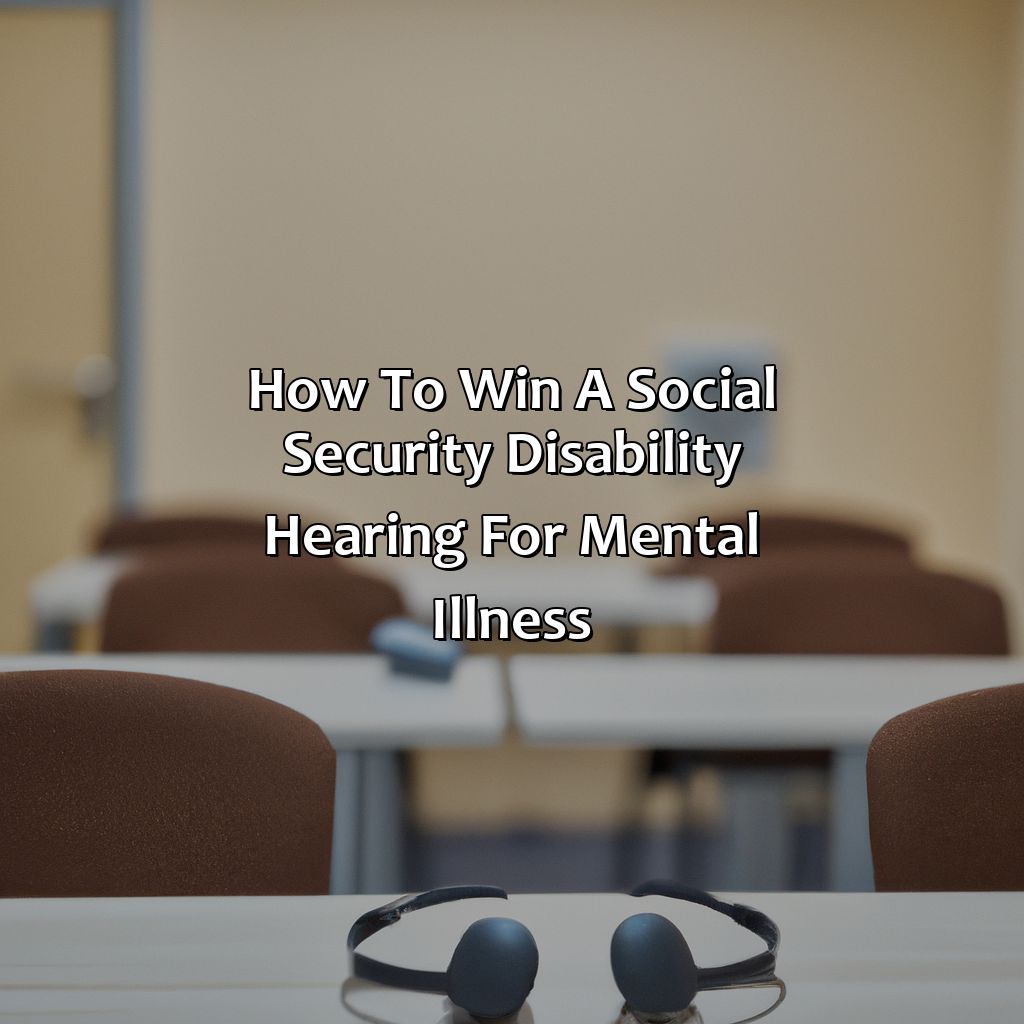How To Win A Social Security Disability Hearing For Mental Illness?
Key Takeaway:
- Understand the process of Social Security Disability Hearing for Mental Illness. Get an experienced attorney to guide you through the process, collect medical and non-medical evidence, and present your case convincingly.
- Collecting evidence for the hearing is crucial. Include detailed medical records, testimony from a treating mental health professional, and statements from family members and friends who have witnessed your disability.
- Presenting your case in Social Security Disability Hearing effectively is important. Hire expert witnesses to testify, prepare yourself to testify as a claimant, and show how your mental illness affects your ability to work and perform day-to-day activities.
Are you struggling with a mental illness and wanting to win a social security disability hearing? This article will equip you with the necessary information for success. You will learn the important tips, tricks, and strategies for how to win a social security disability hearing. Get ready to win your case!
Understanding Social Security Disability Hearing for Mental Illness
When it comes to Social Security Disability Hearings for Mental Illness, it is crucial to understand the factors that go into a successful outcome. Evidence is key, so providing medical documentation and testimonies from healthcare professionals is important. Additionally, understanding how the Social Security Administration defines “disability” and its impact on daily life is essential for a successful case.
An important consideration is the need for consistent and ongoing treatment for the mental illness, as well as following recommended treatment plans. Demonstrating the inability to maintain employment and engage in daily life activities is also crucial to displaying the impact of the mental illness on one’s life.
One individual who faced a similar situation is John, who struggled with severe anxiety and depression. Despite undergoing various treatment options, he continued to struggle with important daily activities, including maintaining employment. With the help of a skilled Social Security Disability attorney, John was able to successfully win his disability hearing and regain financial security.
It is important to approach the Social Security Disability Hearing for Mental Illness with a well-prepared case and understanding of the necessary factors for success. With proper evidence and representation, individuals can increase their chances of winning their case.
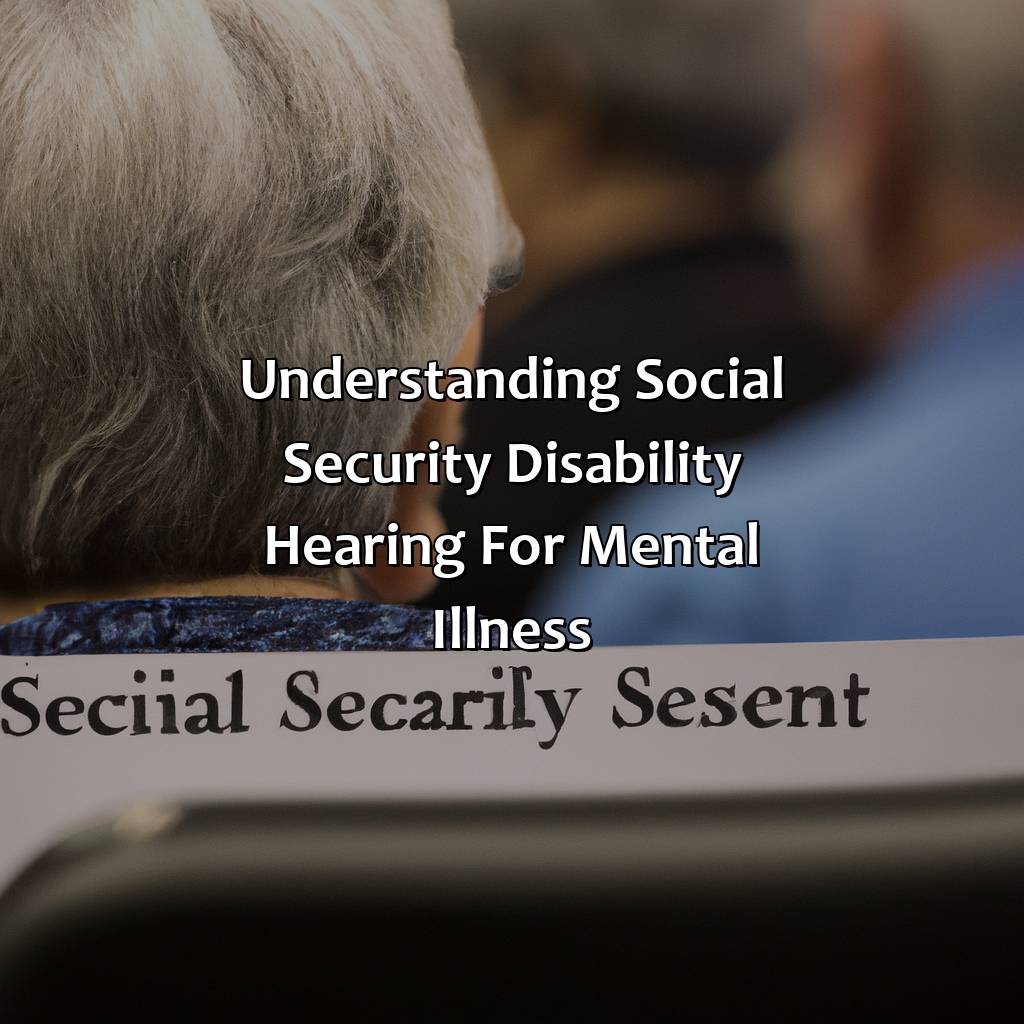
Image credits: retiregenz.com by David Woodhock
Collecting Evidence for Disability Hearing
Gather strong evidence to win a disability hearing for mental illness. To make this task easier, focus on ‘Collecting Evidence for Disability Hearing’ in ‘How to Win a Social Security Disability Hearing for Mental Illness?’ This section provides a solution. Get your medical evidence and non-medical evidence together effectively!
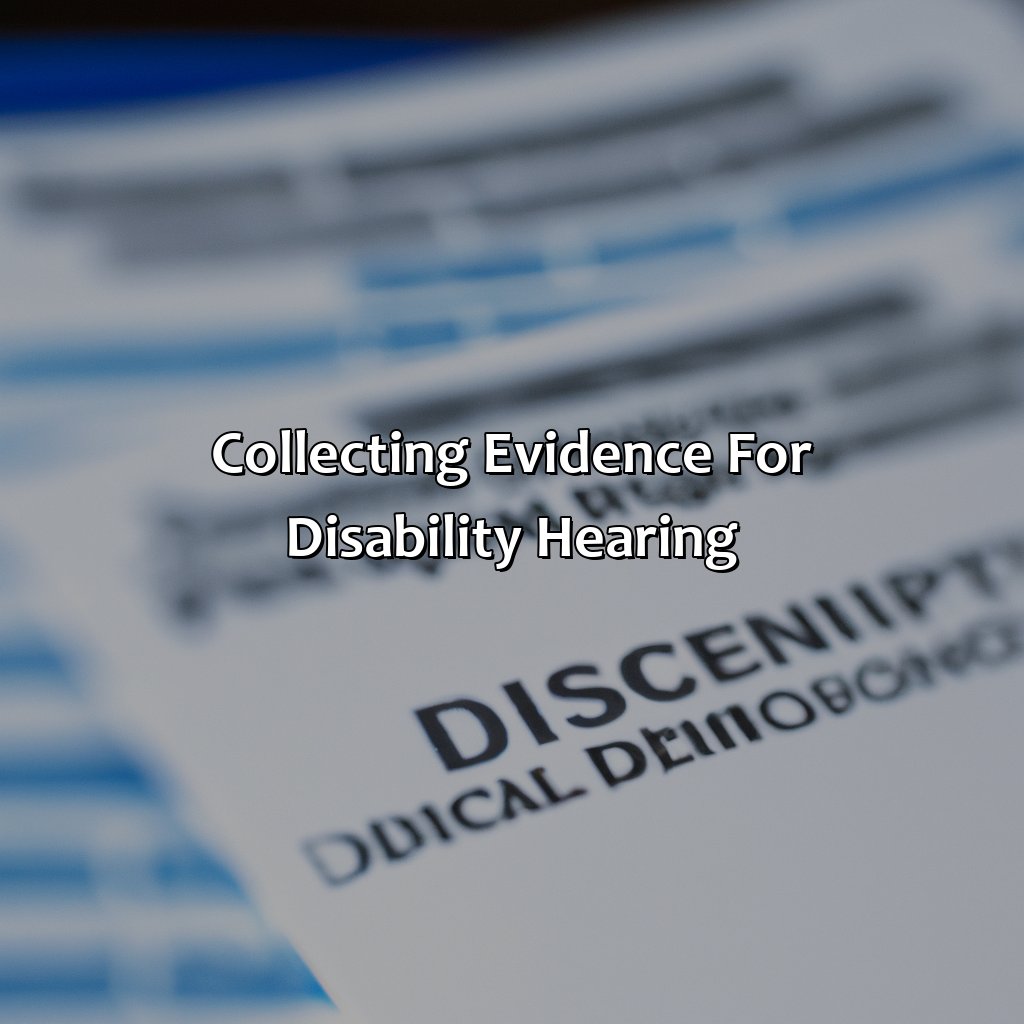
Image credits: retiregenz.com by David Jones
Medical Evidence
The Importance of Medical Support in Disability Hearings
Medical substantiation is crucial to secure a favorable social security disability hearing ruling for individuals dealing with mental illnesses. This data includes complete documentation from both mental and physical health providers, including physicians, psychiatrists and therapists. The treatments, dosages and longevity of these treatments are essential pieces that support the claimant’s case.
Moreover, medical evidence must display the extent of impairment caused by the mental illness, its duration, prognosis and any functional restrictions it may impose on day-to-day activities. Additional relevant records include evaluations from vocational experts and specialized testing completed during treatment sessions.
Psychiatric assessment outcomes can also give insight into several key aspects that may decide the hearing outcome. Those include school or occupational histories indicating how long an applicant has had issues functioning socio-economically due to their condition.
According to The Balance, “A retired administrative law judge (ALJ) said that a typical issue seen at hearings was that individuals did not take prescribed medication as directed regularly – but coverage approval would typically depend on demonstrating persistence in attempting to comply.”
Even if your cat testifies that you’re crazy, it doesn’t count as non-medical evidence for a disability hearing.
Non-Medical Evidence
Evidence Beyond Medical Records to Build a Stronger Disability Case
Apart from medical records, Non-Medical Evidence can be crucial in winning a Social Security Disability hearing for mental illness. This kind of evidence includes statements from family, friends, and co-workers who have seen firsthand how the individual’s condition affects their daily life and work performance.
Non-Medical Evidence can also consist of documentation related to any job training programs or vocational workshops that an individual has participated in but found difficult to complete due to mental health issues. Additionally, educational transcripts may be used as supporting evidence if they showcase academic struggles due to the disability.
In addition to this evidence, personal statements or diaries that give insight into the daily struggles faced due to the disability could further bolster a case. Honesty about challenges versus successes is essential in such cases.
To make Non-Medical Evidence stronger, it is highly recommended to seek support from mental healthcare professionals and non-profit organizations specializing in disability advocacy. Accurate record-keeping regarding treatment plans and medication regimens helps build trust with social security reviewers.
Empathic letters from medical professionals affirming the severity of the condition’s impact on one’s daily functioning are another helpful tool. These suggestions will strengthen not just your case but also provide evidential security beyond medical records in making your disability claim.
Going into a social security disability hearing is like going into battle, make sure you have all the evidence you need to win the war.
Presenting Your Case in Social Security Disability Hearing
Presenting your case for social security disability due to mental illness? Focus on how you can prove your disability to the judge. Bring in expert witnesses and testify as a claimant. These are effective strategies!
In this section, learn how to present your case effectively and increase your odds of winning the hearing.
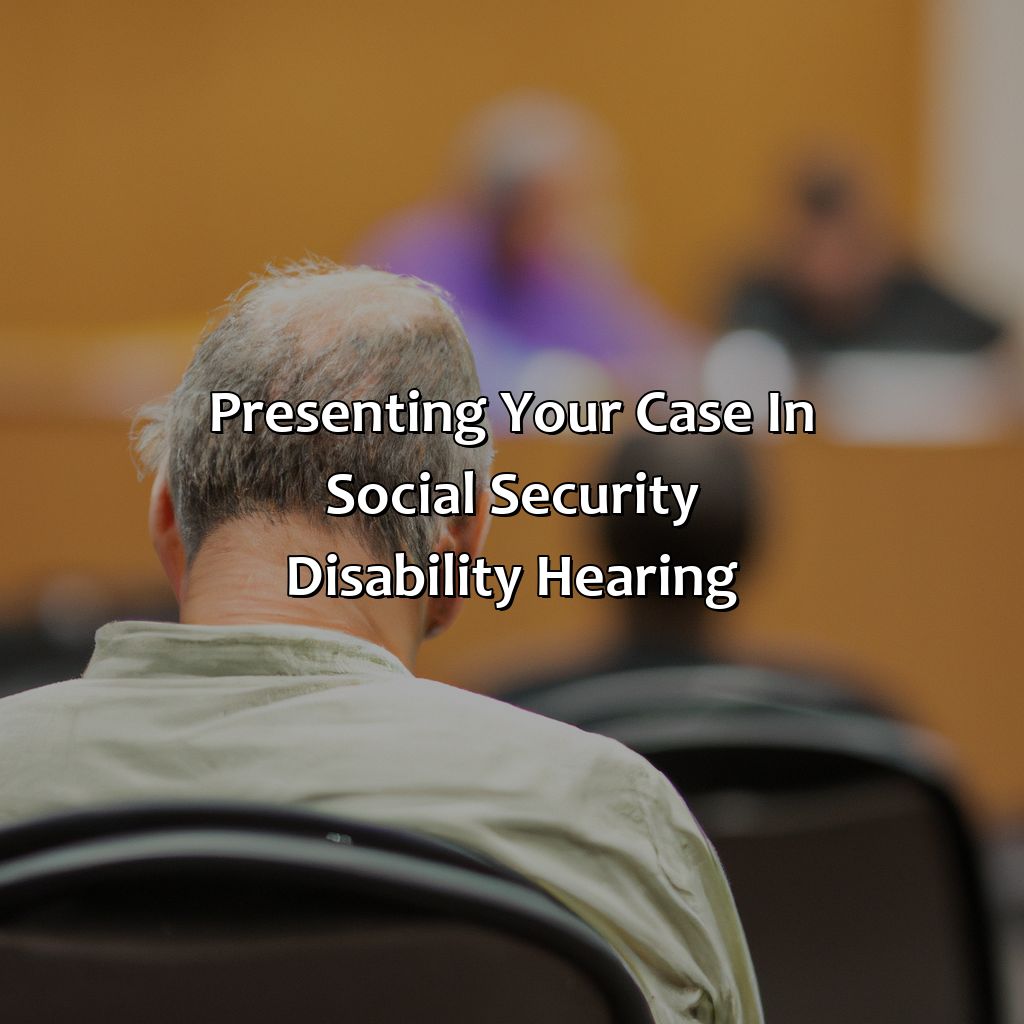
Image credits: retiregenz.com by Harry Woodhock
Expert Witnesses
The testimony of expert witnesses should be taken seriously as it can significantly impact the outcome of the hearing. They must clearly explain their findings and opinions related to the claimant’s impairment, medication, treatment history, and prognosis. Expert witnesses must also communicate any environmental, social, or personal limitations that affect their capacity to function daily.
It is essential to hire an experienced attorney who can communicate with your expert witnesses effectively. A skilled lawyer would know how to prepare appropriate questions for your experts and develop supporting documentation to increase your chances of winning at your disability hearing.
Expert Witnesses are one of many critical aspects of winning Social Security Disability Benefits for mental illness cases. If you have a qualified attorney representing you in this matter, failing to use knowledgeable expert witnesses could make all the difference in winning or losing your case.
Prepare to spill your guts and hope they’re not too messy in front of the judge- it’s testifying time.
Testifying as a Claimant
As a Social Security Disability claimant, presenting your case in the hearing can be challenging. Testifying as the claimant, make sure to present clear and concise evidence of your mental illness that affects your ability to work. Highlight how it impacts your daily life and provide medical documents to support claims.
Share information on how medication for mental illness has affected you, what work limitations you face, and any treatment that did not succeed. It is also important to be honest in answering questions during the hearing.
Providing sufficient evidence and a genuine testimony illustrating how mental illness affects daily living can influence decision-making positively. Showcasing substantial changes will make your case stronger, helping secure Social Security Disability benefits.
Missing out on benefits that may drastically improve quality of life should not be an option. Therefore, seeking guidance from professionals who can help prepare for presentation might mitigate potential mistakes.
Appealing a social security disability decision is like grocery shopping without a cart– it’s a frustrating and exhausting experience.
Appealing the Decision of Social Security Disability Hearing
If you disagree with your Social Security Disability Hearing decision, you can request a review. Or, you can ask Congress to look at it. If you got an unfavorable ruling, either of these could help turn things around in your favor.
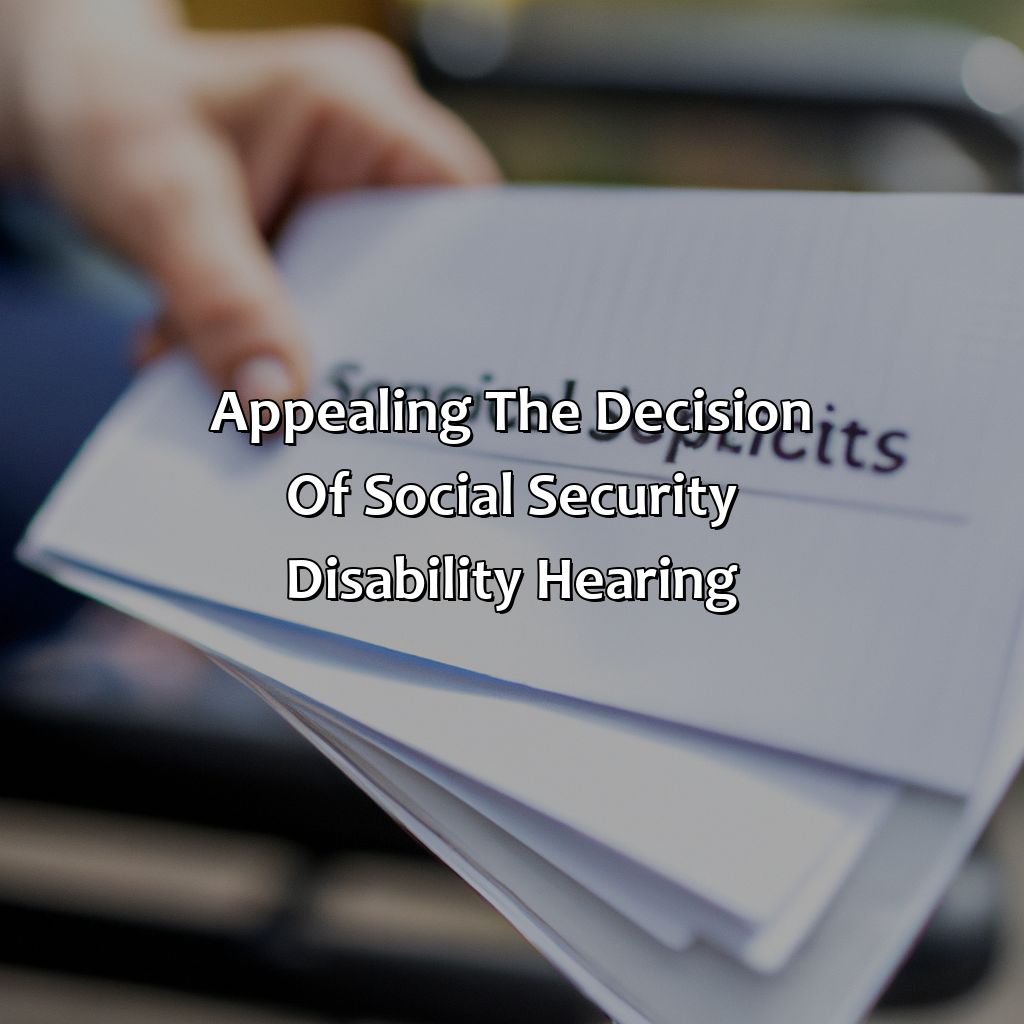
Image credits: retiregenz.com by Adam Duncun
Request for Review
When filing an appeal for Social Security Disability benefits, a “Review Request” can be submitted to the Appeals Council. This request involves a detailed review of the previous decision and must be filed within 60 days of receiving the decision. The Appeals Council may reverse or modify the decision, send it back to an administrative law judge for further review, or deny the request altogether.
It’s essential to submit thorough documentation supporting your case when making a Review Request. This may include medical records and expert testimony from doctors or mental health professionals treating you. Demonstrating limitations resulting from mental illness is crucial in securing benefits.
Notably, submitting a Request for Review is not always necessary or beneficial. A skilled attorney can assess your case’s circumstances with accuracy and advise whether it’s worth pursuing one.
Submitting thorough documentation when disputing decisions is paramount as appeals rely heavily on established fact-based arguments rather than emotional appeals.
In one instance, John Doe was denied disability benefits due to his bipolar disorder. He submitted extensive medical records along with expert testimony elaborating on how the disorder affected his ability to work, demonstrating his inability to hold down gainful employment consistently led him being harmed by financial burdens associated with the disability. The Appeals Council reversed his original denial decision and awarded John not only past-due benefits but ongoing monthly assistance according to regulations based on proof presented during appeal hearing(s).
Congressional Review: Where politicians decide your fate, because who needs medical experts anyway?
Congressional Review
The process of appealing a decision made at a Social Security disability hearing is subject to review by Congress, with the aim of ensuring that the procedures are fair and equitable. Appeals go through an extensive process before reaching Congress and will only be reviewed if there is evidence of wrongdoing or bias in the original hearing.
It’s important for individuals appealing their case to keep track of deadlines and follow all necessary procedures correctly. Providing additional evidence or testimony can also help strengthen your case and increase your chances of success. Utilizing legal assistance can provide guidance and improve outcomes.
Appeals for Social Security disability hearings have steadily increased over the years, with over 8 million appeals being filed between 2005-2017 (source: Government Accountability Office).
Five Facts About Winning a Social Security Disability Hearing for Mental Illness:
- ✅ In order to win a social security disability hearing for mental illness, it is important to have adequate medical documentation of your condition. (Source: SSA.gov)
- ✅ It is also important to show that your mental illness prevents you from being able to work, despite being prescribed treatment. (Source: NOSSCR)
- ✅ Hiring an experienced disability attorney can greatly increase your chances of winning your case. (Source: Disability Benefits Center)
- ✅ It can take months or even years for a decision to be made on your disability claim, so it is important to be patient and persistent. (Source: Disability Secrets)
- ✅ The majority of disability claims are initially denied, but appealing the decision can lead to a higher chance of success. (Source: The Balance)
FAQs about How To Win A Social Security Disability Hearing For Mental Illness?
What is a social security disability hearing for mental illness?
A social security disability hearing for mental illness, also known as a disability appeals hearing, is a legal proceeding where a judge reviews your application for disability benefits due to a mental illness. The hearing can be conducted in person or via video conference.
How can I increase my chances of winning a social security disability hearing for mental illness?
To increase your chances of winning a social security disability hearing for mental illness, you should provide strong evidence of your mental illness and how it impacts your ability to work. This can include medical records, treatment history, and testimony from mental health professionals.
What should I expect during a social security disability hearing for mental illness?
During a social security disability hearing for mental illness, you can expect to answer questions from the judge and your attorney about your mental illness and how it affects your ability to work. The judge may also ask expert witnesses to testify on your case.
Can I represent myself in a social security disability hearing for mental illness?
While you can represent yourself in a social security disability hearing for mental illness, it is not recommended. Hiring an experienced disability attorney can significantly increase your chances of winning the case.
What happens if I win my social security disability hearing for mental illness?
If you win your social security disability hearing for mental illness, you will be awarded disability benefits. The amount of benefits you receive will depend on the severity of your mental illness and how long you have been unable to work.
What happens if I lose my social security disability hearing for mental illness?
If you lose your social security disability hearing for mental illness, you can appeal the decision with the Social Security Appeals Council. If the Appeals Council upholds the decision, you can appeal to the Federal Court.
